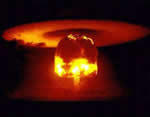 A typical human tendency, or wish, is to look for dramatic worst-case events to burst upon the scene, and then just as quickly disappear to allow for heroic recovery efforts to begin. After all, that's the way it works in the blockbusters and best sellers that keep us coming back for more.
A typical human tendency, or wish, is to look for dramatic worst-case events to burst upon the scene, and then just as quickly disappear to allow for heroic recovery efforts to begin. After all, that's the way it works in the blockbusters and best sellers that keep us coming back for more.With the ongoing saga of Katrina's aftermath still relentlessly, almost silently subjugating victims on the U.S. northern gulf coast, we are reminded that real-life storylines rarely match Hollywood's edge-of-the-seat pacing.
News reporters and anchors were declaring victory over nature's forces in New Orleans even before the backside of Katrina had passed from view. They had apparently been looking for apocalyptic doomsday scenes of collapsing, wind-blown skyscrapers and towering tsunamis quickly erasing all traces of civilization at the mouth of the Mississippi. But alas, even the ancient structures in the French Quarter had stood firm against the gales, and the levee-bounded soup bowl of New Orleans seemed to have kept the waters at bay.
When the epic doom didn't materialize on schedule, well, it was almost time to pack up the microphones and satellite dishes and move on. But then ... wait, why is the water continung to rise in the city? And how could that 17th Street levee give now after the wind and rain had stopped? And how could so many people be crawling out of their houses and hovels to start looting defenseless properties even while the authorities were barely ready to start surveying the damage?
It's Getting Worse
Yes, once again, it is the seemingly anticlimactic postscript that is going to perhaps provide the most compelling part of this story.
Already it is clear that tens of thousands of people, beyond all reason, chose to hunker down and try to ride out what was being billed as possibly the worst storm ever to hit the U.S.--in the worst possible place such a storm could hit--the low-lying New Orleans metro area. Not just "people," but many of them parents with their children! ... ahh, but that's a rant perhaps best saved for another time and place.
Now, many of those people who are scrambling about, increasingly wading and even swimming about in the developing cesspool, trying to find some unguarded treasure to lay hands on, are obliviously facing dangers just as great as those the storm itself immediately presented.
Rising water--no solution to that problem in sight--and the waters carrying ever growing pollutants, contamination, toxic wastes, and even dangerous aquatic creatures ... not to mention the disease-bearing mosquitoes that are being bred everywhere. Fires breaking out throughout the city where emergency services vehicles have no chance of reaching. Gasoline and diesel fuel for emergency services are nowhere to be found. Highways out of the city one by one closing due to the waters, until now the last one is in danger of being swallowed by the flood.
Where this goes from here is anyone's guess. But this much is known:
- Clean drinking water in the vicinty is practically non-existent.
- Power is gone for the long-term.
- Food and fuel supplies, communications, emergency services, and transportation are mostly memories.
- Meanwhile, hundreds of people find themselves waiting for rescue on their rooftops, hoping not to become one the countless bodies floating down the canals that were once boulevards.
- And of course there are countless residents and gawkers trying to get back in the city, clogging up the only passable routes in and out of the area.
The Lessons for the Rest of Us
The point of this blog is to encourage crisis preparedness throughout America. Being ready for disaster is logical, it's smart, it is increasingly the norm. But even when we get to the point when we pat ourselves on the back for being ready, we too often have been thinking in limited terms of a cut-and-dry problem and a nice clean solution. Unfortunately that potentially makes us as vulnerable as ever.
Katrina is once again teaching those of us who are listening that we need to:
- fully respect the power nature wields and realize that our existence within it's sphere can be fragile.
- respect the warnings of authorities who tell us that a danger is real and accept that we need to make responsible choices before and after a potentially disastrous event.
- acknowledge in our readiness efforts that we are not likely to be able to anticipate all that can happen. We must be flexible in our outlook and be prepared for the widest range of possible developments we can imagine or afford.
- NOT count on authorities being there for us at the moment we need them the most. In spite of all the best intentions within relief organizations, the huge scope of resources available to such agencies as FEMA, and the reassuring proximity of our local emergency response groups, the only reasonable approach in preparedness is to go forward as if you are always going to be on your own.
In very large-scale crises such as what we are seeing continue to unfold in the New Orleans area, people needlessly die. It is often a series of mistakes that puts them into that position--failing to prepare beforehand, an unwillingness to heed warnings, then panicking and being unable to use common sense in dealing with their immediate life-threatening crisis. The end looms large, as helpless, they can only hope for someone who IS prepared to miraculously appear with the means to provide salvation.











